#by withholding information from the reader that the character won’t confront/acknowledge
Explore tagged Tumblr posts
Text


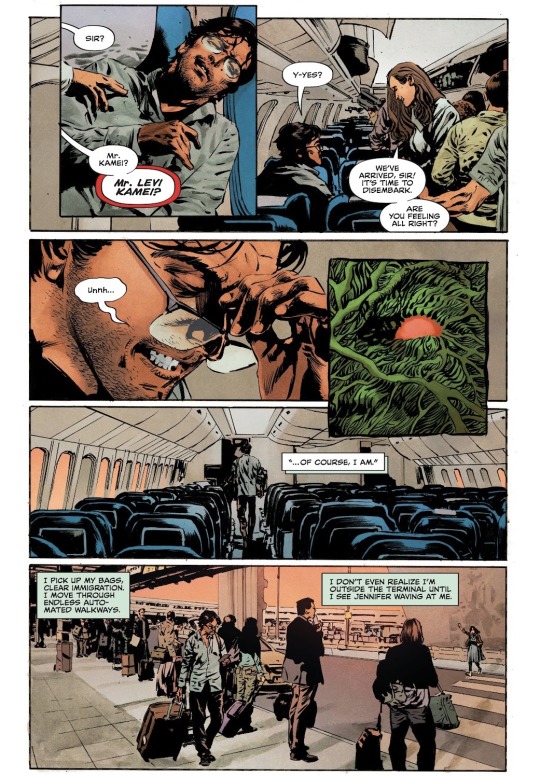
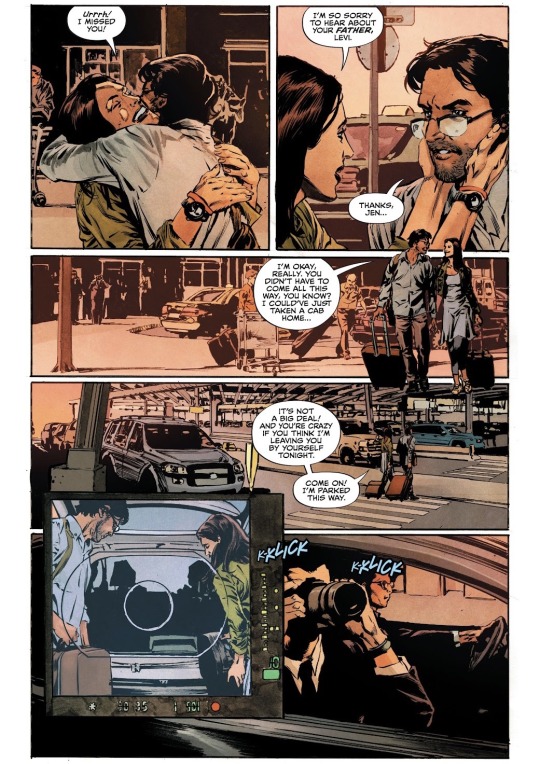

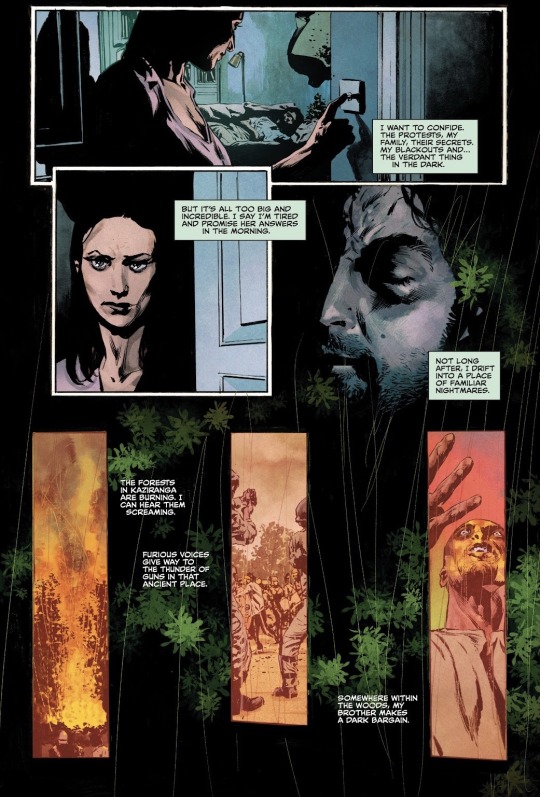

The Swamp Thing (2021) #1
#even though there’s more to be revealed I’m revisiting issue 1 with the new information revealed in issue 7 in mind#noting here that Prescott is into Levi from the very beginning#so they must have discovered that Levi became the Swamp Thing while he was still in India#also that Levi’s brother Jacob ‘makes a dark bargain’#but that’s presumably- directly at least- not what turned Levi into the Swamp Thing#as Jacob referenced later suggesting that he’s responsible for the sickness that’s infecting the green#particularly that’s solely focused on the negative things that humans have done and can’t see the positive#leading to people being infected by bad ideas#so I wonder if he’ll be framed as an extremist and Levi as more responsible/a bridge between humanity and nature#hmm#I think there’s been a lot of emphasis though on how Levi has been irrevocably changed#which is due to him now accepting his father’s teachings#but also due to him now experiencing the world in an incredibly unique way as the Swamp Thing#so he’s not really a ‘human’ perspective so much as a now ancient one#which I guess could be contrasting to human shortsightedness#also it stands out to me that Levi has gone through this traumatic and incredible thing#and then is just sort of attempting to live life as normal#which of course doesn’t work out because he keeps unintentionally transforming into the Swamp Thing#again I like how this series is approaching character development#by withholding information from the reader that the character won’t confront/acknowledge#until they do#the reader knows less than the character but it works because what we are shown is compelling and intriguing enough to mantain interest#dc#the swamp thing#levi kamei#my posts#comic panels
0 notes
Text
The Characters of Nisioisin (2)
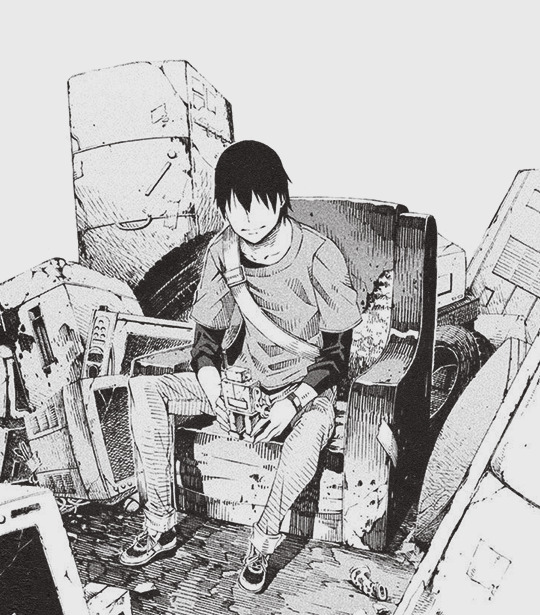
Trickster - Ii (Boku)
This is a post in an ongoing series about the common character archetpyes used by Nisioisin. If you want more information check out the previous post, here. Consider this a part two of that same post. Today we’ll be looking at the nonsense user, and deceiptful protagonist from the aptly titled series “Zaregoto” or in english “Nonsense”. More underneath the cut.
I established the four criteria we are going to be dividing this post into in the previous post, as well as introducing what the idea of the trickster archetype is. Using Kumagawa as the UR-example we’re going to compare Ii-chan with those same tropes.
Introduced as a Villain
Subverts Expectations
Lying, Liar who Lies
Inherent themes of Nihilism
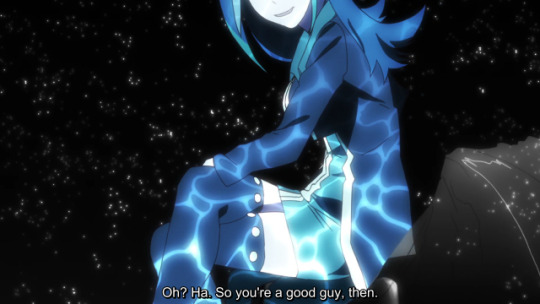
1. Introduced as a Villain
So, next Iichan. He's a special case out of these three because he's actually the series protagonist. But he still kind of fits the criteria because in his series the basic premise of every book is that iichan goes somewhere and a murder happens and then he tries to solve the murder for like the whole book and he sort of kind of solves it and then Jun Aikawa whose much more of a "hero" character than him, the coolest, sickest, strongest detective ever shows up out of nowhere and lectures him.
The sort of conflict set up between Ii-chan and Aikawa as two detectives of the story reminds me of a quote by Maiji Otaro, author of Jorge Joestar (among other things).
“Two detectives, one true. If both are detectives, then both must arrive at the same truth. But does that happen in the novels of this world?” “Most novels with two detectives have one solve it and the other discover the real solution hidden behind it.”
“At that point, are they both still detectives?”
“Hmm.. they’re treated like detectives but certainly, within that novel, the latter is the real detective. But they might switch places in the next novel.”
(Jorge Joestar).
Ii-chan is never introduced as an antagonist from the start of the series he is and always is the narrator. However, he’s still introduced as something he is not. Kumagawa is introduced as a villain and goes on to become a deuteragonist. Iichan is a main character but he doesn’t affect the story like a main character ought to, nor does the story really revolve around him.
So there’s still an inherent lie to his introduction. He is introduced as the center of the story but he is not the story’s real center. However, there’s another subversion implicit in Iichan’s character from the first novel to the second novel.
The first novel is the one where Iichan plays the role of the detective the most straightforwardly. He figures out the trick, solves the case, corners the murderer, but doesn’t solve it all the way and gets lecture by Aikawa at the end. However, there’s a strange way that all the characters react to Iichan despite the fact that he constantly makes himself out to be just a completely harmless, and incapable normal guy.
“Ther’s no meaning. Just like there’s no meaning in your actions. You know, you’re, wow, so you’re the kind of guy who’ll get angry for the sake of a complete stranger. That’s not a very good thing. It’s not bad per se, but it’s not good. [...] That’s because people who can expose their emotions for the sake of someone else are the same people who blame things on others when something goes wrong. I despise people like you.
It had to be the first time in quite a while that someone had spoken that harshly right to my face. Slowly, she brought her glaring gaze to meet my eyes.
“You just let yourself get carried along by other people. You’re the type wo ignores traffic lights just because everyone else is doing it. You’re an abomidable excuse for a human being. They often say ‘Harmonize without agreeing’ but in your case, young man, it’s like you’re agreeing without harmonizing. I won’t say that’s bad. I won’t say anything as to that. One’s identity and worth are not always connnected. A train that runs along a track is better than a train that doesn’t. So I won’t say anything as to that. But I hate people like you. I despise them. People like you always blame things on others, never acknowledging their own responsibility.”
Ii-chan as a character who is introduced as harmless, and passive, never making any choices until we are shown explicitly in the second book that he is not. It’s with his choices in the second book that his true character is revealed.
2. Subverts Expectations
Though for Ii-chan it should really be “avoids any and all expectations.” The Zaregoto is a series that continually asks if the actions of its protagonist are meaningless or not. If any action that Iichan takes effects the outcome of the story in any way.
In Strangulation Romanticist, Ii-chan gets involved with a group of friends who all end up dead or in prison by the end of the story. The central question is what role did Iichan play. Here are some things Ii-chan does in the book, meet with a serial killer and then lie to cover up a police investigation and a private investigator tracking him down giving him time to kill more people, destroys police evidence of another investigation, taunts one girl who murdered another girl into killing herself to atone, knew another murder that was going to take place and did nothing, and then taunts a second girl who wanted to kill herself into killing herself who only survived because the police talked her off a ledge.
“Charges? What charges?” “Falsifying information in regards to the Emoto case, encouraging Aoii’s suicide, not to mention concealment of evidence, plus withholding information and having that little rendezvous with Atemiya. Normally they’d have your ass for that, which I’m sure you’re well aware of, but I’ll take care of it for you. Althought, I suppose even if I didn’t Kunagisa probably would...” (Zaregoto Volume 2)
Therefore, Iichan is someone who acts but doesn’t really face any real consequences for his actions, and that’s because he’s a master of avoidance.
In psychology, avoidance/avoidant coping or escape coping is a maladaptive coping mechanism characterized by the effort to avoid dealing with a stressor. Coping refers to behaviors that attempt to protect oneself from psychological damage.
Iichan is subverting a lot of expectations. He is the protagonist, but the story is not about him. He goes through all of these stories, but he doesn’t ever seem to grow or change from them. He’s a detective, but he never really solves the case or even cares that much about reaching the real truth. He’s written to be a subversion of everything the main character of a detective novel should be.
However, Iichan is also very aware of how a detective should act and deliberately playing with and subverting those tropes. Not only does he subvert the expectations of the reader, but also of the characters around him. He is avoidant, in that way it means he avoids any kind of contfrontation.
I didn’t hate losing. I hated compettition. I was thoroughly put off by the idea of vying for others over something. I hated fighting as well and thus never made friends.
This is a line that gets reused for Kumagawa as well.
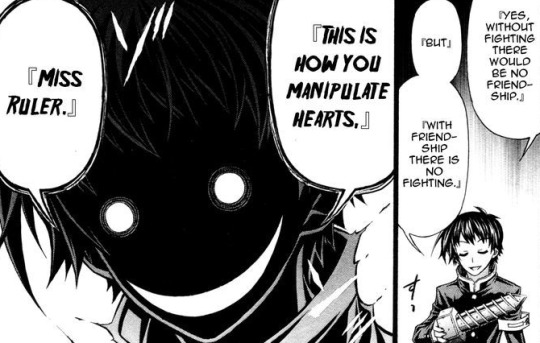
Which helps to illustrate the difference between them. Let’s say there is a problem, Kumagawa will charge head first at the problem and it will explode in his face, and Iichan will do everything in his capacity to never confront the problem or deal with it in any way possible.
Iichan is deliberately aware and sensitive to the expectations of the other people around him, and he feels like he will always be too inferior to fulfill them so he doesn’t even bother to try.
“I have been doing so.” I said. “But you know I have limits, too. It seems like everyone and anyone harbors some sort of expectations from me, and of course I would love to meet their expectations, too, but I cannot meet the expectations if I lack the capability. So to have someone say you failed my expectations is nothing but bothersome.”
Zaregoto Volume 4.
The way he avoids the expectations of others is rendering himself as ambiguous as possible, which is where we get to the next part.
3. Lying, Liar who Lies
Iichan is an unreliable narrator who never tells the truth in a straightforward manner, and even lies for half of the second volume. However, there’s more than that, there’s a deliberate trick to the lies he tells.
Iichan is someone who defines himself as ambiguously as possible. He acts like someone who others cannot possibly understand. Despite narrating from the first person, Iichan is only comfortable when he is not known by anyone. Iichan acts like someone who is barely present in his own story.
Answers have no real point. They’re vague and ambiguos and unsound, and things that are fine that way. In fact, they’re better. Causing real change is a role that should be left up to the true “chosen ones” outstanding individuals like that scarlet Mankind’s Greatest, and the Blue Savant, it was never my responsibility. It was no job for a common loser. For the comic sidekick.
Zaregoto volume 2.
Once again we see the contrast between Kumagawa and Iichan, if Kumagawa is a character who shows how strong and capable one loser can be, then Iichan often waxes poetically in his narrative about how weak and incapable he is. If Kumagawa is a good loser, than Iichan is a sore one.
Iichan defines himself as ambiguous on purpose to avoid responsibility for his actions. In less fancy words, if nobody can understand Iichan than nobody can call him on his shit. That’s his goal, essentially. He doesn’t want to work hard to change, or be confronted about any of his actions, because for him merely the act of living takes all of his effort to tread water without making any progress.
Avoidance is a trauma response, Iichan spends all of his time distancing himself from his own actions rather than confronting any of it. However, Iichan is more complicated than that because Iichan’s ambiguity has another side effect making him out to be something that he is not.
“Just by being there, you startle others, just by being there, you make people lose their grip on themselves.. ther’re a bunch of people like that. You can’t relax when you’re with them, it annoys you, things don’t go as planned, people like that, you know, they’re even scientifically explainable. In other words the missing part. Because the missing part for the observer ends up looking the same, it feels like the person is having their ineptitude pointed out at them, and it startles them [...] You’re just like everyone, and that picks at people’s subonscious, that’s why you’re aimless. And yet you still manage to come out on top. [...]”
Zaregoto Volume 3
All of these things Jun points out in this scene are Jungian ideas of the trickster. Iichan is an inferior person who seems to exist to point out the inferiorities in other people, and use it to play tricks on them. While viewing him as this role of the trickster, Aikawa is not really treating him like a person. (Aikawa’s very dramatic).
Which is where Iichan finally gets his trick. It’s a trick in two parts. He constantly underplays his own agency, while at the same time overplaying his suffering.
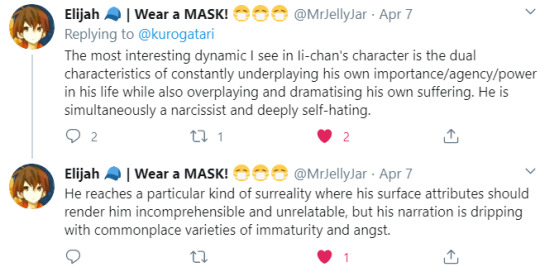
In other words, while insisting that he is the least improtant person on earth, Iichan at the same time hems and haws like the main character of a tragedy. IIichan wants people to empathize with his suffering, and he wants to be important, but he doesn’t want any of the responsibility of being important. He doesn’t want to take any degree of control of himself or others, so he tries to balance himself between these two conflicting ideas.
1) He is not a protagonist, and therefore the events in the story have nothing to do with him. 2) He is the main character of a tragedy. The world is centered around him, he is someone special and important, and that makes him suffer, but he takes no agency in the role.
Doing this he gets the best of both worlds. He gets to always be involved and important to others, while at the same time uninvolved and is never held accountable for his actions. He’s never challenged or forced to grow or change in any way.
These are the two lies that Iichan tells, and those lies form a narrative. Iichan is lying to give a narrative to his own trauma, and therefore try to extract some kind of meaning from it.
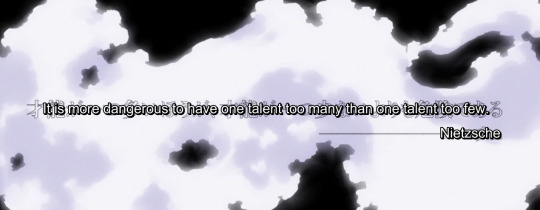
4. Inherent Themes of Nihilism
We once again return to the sacred image.
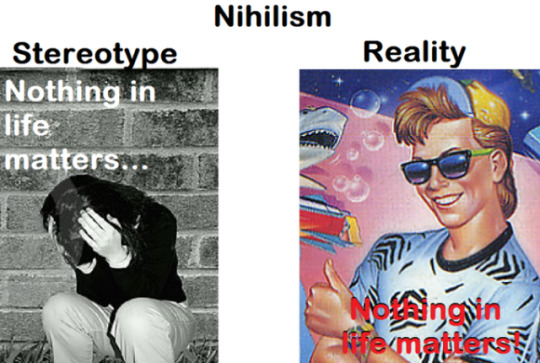
Iichan is a moral nihilist. He’s on the elft side of that image.
Moral nihilism (also known as ethical nihilism) is the meta-ethical view that nothing is morally right or wrong. It is built on three principles.
1. There are no moral features in this world; nothing is right or wrong. 2. Therefore, no moral judgments are true; however, 3. Our sincere moral judgments try, but always fail, to describe the moral features of things.
Iichan’s view is basically that of, if there is no meaning to this world then any attempt to define meaning is pointless. He (let’s say it again class) usually uses this as an attempt to evade any and all responsibility for his actions.
Iichan doesn't want other people to look at him, he doesn't want to be at fault when things go wrong, but he also wants to be important. So he's continually on a tight rope walk with those two very conflicting desires.
So basically Iichan sees no value in his own actions. He sees no value in the world. He doesn't really have any set of morals, except that he thinks murder is bad. Except sometimes he doesn't really care if certain people are murderers. Zerozaki is a murderer and Iichan hates him but doesn’t actually make any sincere attempts to stop him. Kunagisa commits murder in volume 4/5 and Iichan goes out of his way to cover it up. He apparently doesn’t consider goading a girl into suicide to be a form of murder. But at the same time he's so desperately searching for meaning, because he wants to feel fulfilled.
Iichan thinks that talent and genius are perhaps one thing that could give the world meaning. His best friend is a super genius, and he kind of clings to her and is jealous of her because she's someone special. See he thinks there are people whose lives have meaning despite being a pretty blanket nihilist, but because he's not talented he's not one of those people. Talent is something that could possibly give life meaning but being outside of the talented people it makes no difference to him he can only gaze at it from afar
Iichan is someone who is constantly downplaying his own meaning, while at the same time trying to find some meaning vicariously through others, like Aikawa and Kunagisa who he considers to be the real heroes of the world. Despite Iichan insisting there’s no meaning, he also has an attraction to narrative view of the world. Which is something that you know... has meaning, because stories are written with intent and purpose by an author.
In the sixth volume there’s a concept called “The Story” which one character belives that everything is pre-destined, like it’s all some pre-written story. Therefore while you can make small changes in your own actions it never effects the big picture in any way.
This is once again a very convenient idea for Iichan, who avoids responsibility to believe in. He’s very attracted by this idea because it takes control out of his hands and means his own actions aren’t really his fault.
To be honest, this must be one of the most boring conversations to be listening in on. It had gone so far into the conceptual, that even for myself, participating in the conversation, the words of the man with the fox mask seemed as hazy and illusory as a dream. You could say I do not understand what he is saying. However, then why. Then why does what this person says strike so deep? Why does it resonate? [...] Then, no. I do not want any part of such importance. I do not want anything to do with the core of the story.
Here we go with Iichan’s double negative, he denies having any role or agency in the story and yet at the same time believes that such a thing as the story exists because it means to some extent his actions are out of his control because he can’t accept that they are.
Is Iichan’s role in the story ultimately meaningless? No. There are always clear and distinct consequences for his actions. In the same volume (6 - cannibal magical) where the concept of the story are first introduced that everything is predetermined and you can’t change the big picture, the events of the story disprove that assertion.
Iichan is given like, a million warnings not to go to a lab. Aikawa tells him not to go to a lab because she has a bad feeling about it. The literal assassin sent to that lab talks to Iichan and says “Yeah, I was sent here to kill people.” Another person who was in the same situation just walks away from the problem. Iichan sees the assassin going out to kill people in the middle of the night and just chooses to... go to sleep.
Then he wakes up to everyone dead in the morning. The point being Iichan had a million chances to avoid this situation, takes absolutely none of them, and then acts like this was a completely unavoidable fate. He hems and haws about having no choices, but he’s clearly given choices, he just doesn’t take them, or makes exclusively bad ones.
Iichan wants to avoid consequences by not choosing, however the choice to not choose is still a choice in itself. Everything is a choice. Even avoidance is a choice. Which is why Iichan’s actions do actually have meaning, just not in the way he wants them to. He’s not a special person, and he’s not anyone extraordinary, but he is someone who has to face the consequences of his actions no matter how many narrative tricks he pulls to avoid them.
The actual trick of Iichan’s story is that he really is the protagonist, he just doesn’t want to be.
71 notes
·
View notes
Text
State of Play (and the state of Australia’s press freedom)
This week I got to thinking (insert Carrie Bradshaw voice here) about one of my favourite television shows, ‘State of Play’. I try to rewatch it every three to six months, scheduling it in like a dental check-up. There is in fact a big screen adaptation of the same story, starring a then-hot Ben Affleck and Eternal Queen of the World Rachel McAdams that came out in 2009, but I’m here to talk about the BBC originale.
I’ll skimp on the plot bc it twists and turns more than my stomach after I’ve had full dairy milk, but here’s the main thrust: a young kid gets shot on the streets of London the same morning as a young political researcher falls (or gets pushed hmmm) under a train. They’re connected by a single phone call. The researcher is discovered to be having an affair with her boss, who happens to be an MP. A conspiracy is introduced that may involve all of them, the British govt and a shady oil company. Enter stage left the scruffy maverick journalist and his team trying to find the truth. Have I whetted your appetite yet?
Now here’s the reason this particular series was floating around in my subconscious. On Monday multiple Australian newspapers ran redacted articles and documents on their covers, as part of a campaign called Your Right To Know. They were all heavily edited and asking the same question: ’When government keeps the truth from you, what are they covering up?’, as well as my personal favourite ‘News restrictions. Secrecy. Jail terms for journalists and whistleblowers. It couldn’t happen in Australia? It’s happening now.’ This exact same thing happens in State of Play. Now this isn’t by any means a political website (lol, blog) and I’m not here to make it one, but hopefully we can all agree that press suppression is Bad, and holding the govt to account, plus questioning their decision-making and actions is Good. We all know the govt (and practically all govts around the world) do some Questionable Things. Things that we don’t, and probably won’t know about for a number of years, if ever. Despite whatever political beliefs you subscribe to, when it comes to govt cover ups I dare u to try watching the masterpiece of cinema ‘Enemy of the State’ and come out of it not being slightly paranoid and mad about the unknown powers our or any political authority may have.
But getting back to the current issue. Since 2002, there have been 75 pieces of federal legislation have been introduced, intending to protect the public from national security threats but their purpose is essentially to stop the public from knowing what the Federal Government is doing. Journalists are being targeted, raided and silenced. We all know press suppression always starts before the really bad shit hits the fan.
To cap off the dystopian nightmare our country is falling into, new research has revealed 87 per cent of Australians value a free and transparent democracy only 37 per cent believe this is happening in Australia today. Love!! this!! for!! us!!
The issue of press freedom is constantly raised in State of Play, over 15 years ago. Fortunately British reporters are more protected than they are here in Australia where they have no constitutional safeguards, while in the UK journos are protected under the Human Rights Act. They're not perfect but it’s a more than our own country has done.
A scene plays out in State of Play which is what I’m sure (I mean, hopefully) went down in the newsrooms of the Sydney Morning Herald, Daily Telegraph and countless others earlier this week - an editor runs a redacted front page calling attention to a huge issue - in this case Bill Nighy’s superb Cameron Foster is targeting the UK govt over their dealings w an oil company. He runs the headline ‘The story we can’t show you. Because Westminster have gagged us. Ask U-Ex Oil why. Ask your MP why.’ It’s a deafening threat to their foes in Westminster and basically a declaration: whether you try to bury the story or not, there’s no way it’s not getting out. Later we see the final story being printed and delivered, uncensored to readers - a victory for the fourth estate’s triumph over government might.
The show was written by Paul Abbott, who has his own fascinating and tragic backstory and directed by the man who helmed the last four Harry Potter films (and two spin-offs), David Yates.
Beyond the plot, the series tackles issues of class, race (a black kid is killed in the opening scene and subsequently profiled as a drug user despite there being no evidence to support the theory), and adultery, (don’t get me goddamn started on this sub-plot) while examining the personal repercussions that come with reporters - or anyone finding a story and sticking to their guns on it. That’s not to mention characters becoming completely desensitised to the death and destruction that follow them. One of the most fascinating exchanges in the series is between a police officer and a reporter. One refers to the events around them as a case, with real lives and people involved, the other a story that has a deadline, damn the consequences. It’s clear then the price for exposing the worst of humanity is to lose some of your own.
John Simm is our leading man, the aforementioned scruffy journalist Cal McAffrey. Boardwalk Empire’s - or Nanny McPhee and Trainspotting depending on your vintage - Kelly McDonald is his fellow lead reporter Della, seemingly the everywoman among the occasional madness, and she has a special place in my heart due to her large number of denim jackets.
I’d like to also acknowledge to the excellent supporting characters beginning w James McAvoy who gives a spectacularly smarmy yet hot - despite a terrible wardrobe - performance as a journo working for a rival paper who then joins the team. Amelia Bullmore and Benedict Wong round out the main gang of reporters as Westminster correspondents Helen Prager and Pete Cheng. David Morrissey plays the perpetually sad and wounded politician Stephen Collins who is an absolute puzzle. Special mention to Bill Nighy as their editor-in-chief who says things like ‘I’m the sceptical one, so don’t push it Tonto’ and ‘bring us a bottle of red and four glasses’ when confronted with a piece of incriminating evidence. Another shining star is Liz the newsroom intern who is too good to describe here but is possibly the best part of the entire series and gets away with the best lines (excluding ‘ole Bill).
I kept an article that talked about State of Play and other smilier films and series on my cork board for about seven years, till the paper got yellowed and fragile. It described the tactics the journos in State of Play use as ’..Like a road map of the horrors of modern British journalism: phone-tapping, withholding evidence, more lies than the News of the World. And these are done by the good guys; the people they go after are murderers.’
In short: I’m never going to be able to describe all the ways I love this show, but for now I say: watch it. Watch it for six hours of absolutely cracking television, the character arcs, the terrible 2003 fashion choices, for Bill Nighy, for young James McAvoy. But most of all watch it bc you’ll see what’s going on right now reflected in every action and every scene. When characters are arrested in their newsroom, intimidated by both politician and policemen alike think of what’s going on rn in our dang country. When Cal protects his anonymous sources remember that Australia’s shield laws are still quite limited the it comes to preventing journalists from being charged over naming confidential informants. And most of all when the team are pressured into dropping the story by the higher-ups, think of the blacked out papers we all picked up on Monday morning when our press agencies decided to ask ‘what are they covering up?’
As Cameron says ‘Big day. Big story. Big hitters.’
1 note
·
View note